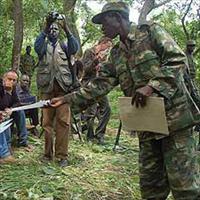UGANDA: LRA sticks to its guns, yet ready to sign peace deal

A final peace agreement to end two decades of conflict in northern Uganda is expected to be signed on 5 April, but the rebel Lord's Resistance Army (LRA) said it would only disarm if indictments issued by the International Criminal Court (ICC) against its top leadership were deferred.
"A signed copy will be given to (the Ugandan) government. Then the government will have the obligation to take the copy to the UN Security Council and ask for a 12-month suspension of the warrants before the LRA could disarm," David Matsanga, the head of the LRA delegation at the talks, told IRIN
This represents a softening of the LRA’s position. During the months of peace talks in Juba, the rebel movement had insisted the indictments be dropped altogether, but the ICC prosecutor dismissed the idea, even though the Rome Statute that guides the court allows him to rule that Ugandan courts are competent to handle the case themselves, and that one of the agreements reached during the talks provided for a special division of the Ugandan high court to be set up to try war crimes committed during the conflict.
The Rome Statute also empowers the Security Council to override the prosecutor and defer a prosecution for a renewable 12-month period.
"We have agreed that the tentative date for signing is 5 April and we are still continuing debating other aspects of the final agreement," Matsanga’s deputy, James Obita, told IRIN.
The LRA fought against the government of President Yoweri Museveni for two decades, mainly attacking civilians in the north and east of the country. The group was widely accused of committing atrocities, including torching homes and camps for the displaced, killings, rape and the abduction of children for military conscription and sexual slavery.
The Ugandan government asked The Hague-based ICC to investigate the LRA for war crimes and in 2005 warrants were issued for the arrest of five top LRA commanders, including the group’s leader Joseph Kony.
Government delegation spokesman Chris Magezi said an existing cessation of hostilities agreement would not be formally extended beyond 28 March, when it expires, but said the truce would be respected “in a manner of a gentleman’s agreement”.
The LRA team was scheduled to travel to the Ri-Kwangba area of Southern Sudan for the final consultation with senior leadership on the settlement.
"They will either return with Joseph Kony or anybody authorised by the rebel high command to sign the agreement on its behalf," Magezi added.
Obita, however, said the ICC indictments might discourage Kony from emerging from hiding to sign the peace agreement.
The cessation of hostilities deal was forged in August 2006, two months after the two parties agreed to peace talks mediated by the Vice President of Southern Sudan, Riek Machar.
Scores of civic and religious leaders from northern Uganda arrived in Juba on 25 March to witness the signing that was earlier scheduled to take place on 28 March.
 Back and Next - Back and Next
Back and Next - Back and Next See Also - See Also
See Also - See Also